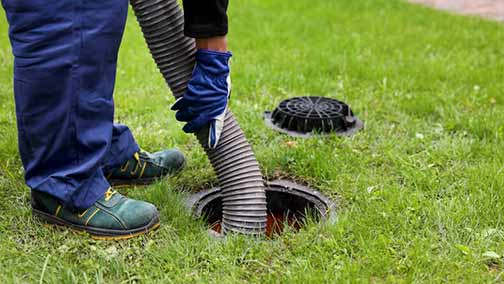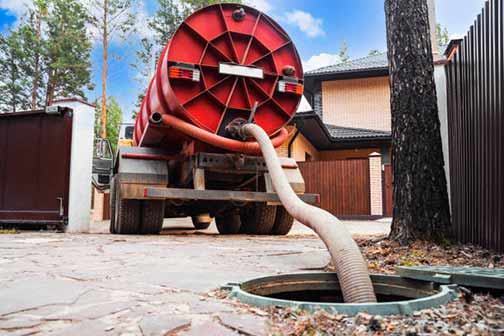
Septic tank pumping is a crucial maintenance task that ensures the proper functioning of your septic system. Regular pumping prevents the buildup of solids, which can lead to blockages, system failure, and costly repairs. For homeowners in Illinois, understanding the importance of this process is the first step toward maintaining a healthy and efficient septic system. By regularly removing the accumulated sludge and scum from your septic tank, you can prevent the overflow of solids into the drain field, which can cause clogging and system failure.
Moreover, regular pumping helps maintain the balance of bacteria in your septic tank. These bacteria are essential for breaking down organic matter and ensuring the system operates efficiently. Without regular pumping, the buildup of solids can disrupt this balance, leading to reduced system performance and potential health hazards. Additionally, proper maintenance of your septic system can protect your property value by preventing costly repairs and ensuring the longevity of the system.
Identifying the Right Time for Septic Tank Pumping
Knowing when to pump your septic tank is essential. While the general recommendation is to pump every three to five years, the frequency can vary based on factors such as the size of your household, the size of the septic tank, and the amount of wastewater generated. Homeowners should monitor their system for signs of trouble, such as slow drains, unpleasant odors, or pooling water in the yard. These signs may indicate that your septic tank is full and needs to be pumped.
It’s also important to consider the age of your septic system. Older systems may require more frequent pumping due to wear and tear. Additionally, if you have a garbage disposal, you may need to pump your septic tank more often, as the disposal increases the amount of solids entering the tank. Regular inspections by a professional can help determine the optimal pumping schedule for your specific system.
Preparing Your Property for Septic Tank Pumping
Proper preparation of your property can ensure a smooth and hassle-free septic tank pumping process. Here are some practical tips to help you get ready:
Locate the Septic Tank
Before the pumping service arrives, locate your septic tank. This may require consulting your property’s as-built drawings or septic system plans. If you are unable to find the tank, consider hiring a professional to locate it for you. Knowing the exact location of your septic tank will save time and help the technicians perform the job more efficiently.
Clear Access to the Septic Tank
Ensure that the area around the septic tank is clear of obstacles, such as vehicles, debris, or landscaping. This will allow the pumping service to easily access the tank and perform the necessary work. Trim any overgrown vegetation and remove any obstacles that may hinder the technicians from reaching the tank. Providing clear access will help expedite the pumping process and prevent any potential damage to your property.
Inform the Pumping Service of Any Special Considerations
If there are any unique aspects of your property or septic system, such as difficult terrain or unusual tank placement, or a sump pump system in involved, inform the pumping service in advance. This will help them prepare and bring the appropriate equipment. Additionally, if you have any concerns or specific instructions, communicate them to the technicians before they begin the work. Clear communication will ensure that the job is done correctly and efficiently.
Choosing a Reputable Septic Tank Pumping Service
Selecting a reputable and experienced septic tank pumping service is crucial for ensuring the job is done correctly. Look for companies with positive reviews, proper licensing, and insurance. Ask for recommendations from friends, family, or neighbors who have had similar work done. A reputable company will have the necessary expertise and equipment to handle the job efficiently and safely.
When choosing a septic tank pumping service, inquire about their experience and the qualifications of their technicians. Ensure that the company follows industry standards and adheres to local regulations. Additionally, ask for a detailed estimate and compare prices from multiple companies to ensure you are getting a fair deal. A reputable company will provide transparent pricing and a clear explanation of the services they offer.

What to Expect During the Septic Tank Pumping Process
Understanding what happens during the septic tank pumping process can help alleviate any concerns and ensure you are well-prepared. The process typically involves the following steps:
Inspection
The technician will inspect the septic tank and system components to assess their condition and identify any potential issues. This may include checking the tank for cracks, leaks, or signs of wear. The technician will also examine the baffles and filters to ensure they are functioning properly. A thorough inspection helps identify any problems that need to be addressed before pumping begins.
Pumping
The technician will use a specialized vacuum pump truck to pump out the solids and liquids from the septic tank. This process can take anywhere from 30 minutes to a few hours, depending on the size of the tank and the amount of waste. The technician will carefully remove the sludge and scum, ensuring that the tank is thoroughly cleaned. Proper pumping helps maintain the efficiency of the septic system and prevents potential issues.
Cleaning and Maintenance
After pumping, the technician may clean the tank and inspect components such as the baffles and filters. They may also recommend any necessary repairs or maintenance to keep the system functioning optimally. Regular cleaning and maintenance help extend the life of your septic system and ensure it operates efficiently. The technician may also provide advice on how to maintain your system between pumpings.
Post-Pumping Care and Maintenance
After your septic tank has been pumped, there are several steps you can take to maintain the system and prolong the time between pumpings:
Monitor Water Usage
Excessive water usage can overload the septic system. Be mindful of your water consumption and consider installing water-saving fixtures to reduce the strain on the system. Fix any leaks promptly and avoid running multiple water-intensive appliances simultaneously. Conserving water helps maintain the balance of your septic system and prevents overloading.
Avoid Flushing Non-Biodegradable Items
Only flush biodegradable items down the toilet. Avoid flushing items such as wipes, feminine hygiene products, and chemicals, as these can cause blockages and damage the septic system. Educate your household members about what can and cannot be flushed to prevent potential issues. Proper disposal of non-biodegradable items helps maintain the efficiency of your septic system.
Regular Inspections
Schedule regular inspections of your septic system to catch any potential issues early. This can help prevent costly repairs and ensure the system continues to function properly. A professional inspection can identify problems such as leaks, cracks, or worn components that need to be addressed. Regular inspections help maintain the health of your septic system and prolong its lifespan.
Understanding Local Regulations and Requirements
In Illinois, there are specific regulations and requirements for septic systems. Homeowners should familiarize themselves with these regulations to ensure compliance and avoid potential fines or penalties. Contact your local health department or environmental agency for information on septic system regulations in your area. Understanding and adhering to local regulations helps ensure the proper functioning of your septic system and protects the environment.
Additionally, some areas may have specific requirements for septic tank pumping, such as mandatory pumping intervals or inspection requirements. Stay informed about any changes in regulations and ensure that your septic system complies with all local guidelines. Compliance with regulations helps prevent potential legal issues and ensures the safety and efficiency of your septic system.

Common Issues and Troubleshooting Tips
Even with regular maintenance, septic systems can encounter issues. Here are some common problems and troubleshooting tips:
Slow Drains
Slow drains can indicate a blockage in the septic system. Try using a septic-safe drain cleaner or contact a professional for assistance. Avoid using chemical drain cleaners, as they can harm the bacteria in your septic tank. Regularly clean your drains and avoid pouring grease or oil down the sink to prevent blockages.
Unpleasant Odors
Foul odors around your septic system can signal a problem. Check for leaks or blockages and contact a professional if the issue persists. Ensure that your septic tank is properly vented to prevent odors from escaping. Regular pumping and maintenance help prevent odor issues and ensure the proper functioning of your septic system.
Pooling Water
Pooling water in your yard can indicate a failing septic system. This requires immediate attention from a professional to prevent further damage. Pooling water may be a sign of a clogged drain field or a full septic tank. Addressing the issue promptly helps prevent environmental contamination and protects your property.
Benefits of Regular Septic Tank Pumping
Regular septic tank pumping offers numerous benefits, including:
Preventing System Failures
Regular pumping helps prevent system failures by removing accumulated solids that can cause blockages and backups. By maintaining a regular pumping schedule, you can prevent costly repairs and ensure the longevity of your septic system. Preventing system failures also protects your property from potential damage caused by sewage backups.
Extending the Life of the System
Proper maintenance, including regular pumping, can extend the life of your septic system, saving you money on costly repairs or replacements. A well-maintained septic system operates more efficiently and has a longer lifespan. By investing in regular pumping and maintenance, you can avoid the expense and inconvenience of replacing your septic system prematurely.
Protecting the Environment
A well-maintained septic system helps protect the environment by preventing contamination of groundwater and local waterways. Regular pumping ensures that your septic system operates efficiently and reduces the risk of harmful pollutants entering the environment. Protecting the environment also helps maintain the health and safety of your community.
To Wrap It Up
Preparing for septic tank pumping is an essential task for Illinois homeowners. By understanding the importance of regular pumping, knowing when to schedule service, and properly preparing your property, you can ensure a smooth and hassle-free process. Additionally, choosing a reputable service, understanding local regulations, and maintaining your system post-pumping will help keep your septic system functioning efficiently for years to come.
Regular maintenance and proactive care are key to preserving the health and longevity of your septic system, protecting your property, and safeguarding the environment.

